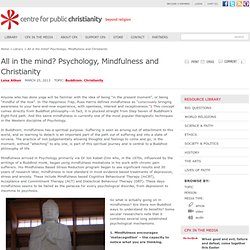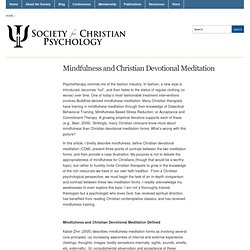

All in the mind? Psychology, Mindfulness and Christianity Anyone who has done yoga will be familiar with the idea of being “in the present moment”, or being “mindful of the now”.

In The Happiness Trap, Russ Harris defines mindfulness as “consciously bringing awareness to your here-and-now experience, with openness, interest and receptiveness.”1 This concept comes directly from Buddhist philosophy—in fact, it is plucked straight from Step Seven of Buddhism’s Eight-Fold path. And this same mindfulness is currently one of the most popular therapeutic techniques in the Western discipline of Psychology. In Buddhism, mindfulness has a spiritual purpose. Mindfulness for Christians. Thus affective and cognitive patterns can indeed change your brain.

Think about this. What patterns of thought do you engage in on a repetitive basis? Do you have a habit of fantasizing? Mulling over bitter or jealous thoughts? While some of these may come naturally to you, what you do with them may actually change or strengthen neural connections in the brain - for better or for worse. Mindfulness and Christian Devotional Meditation. Psychotherapy reminds me of the fashion industry.

In fashion, a new style is introduced, becomes “hot”, and then fades to the status of regular clothing (or worse) over time. One of today’s most fashionable treatment interventions involves Buddhist-derived mindfulness meditation. Many Christian therapists have training in mindfulness meditation through their knowledge of Dialectical Behavioral Training, Mindfulness-Based Stress Reduction, or Acceptance and Commitment Therapy. A growing empirical literature supports each of these (e.g., Baer, 2006).
Strikingly, many Christian clinicians know more about mindfulness than Christian devotional meditation forms. Mindfulness – a Christian perspective.